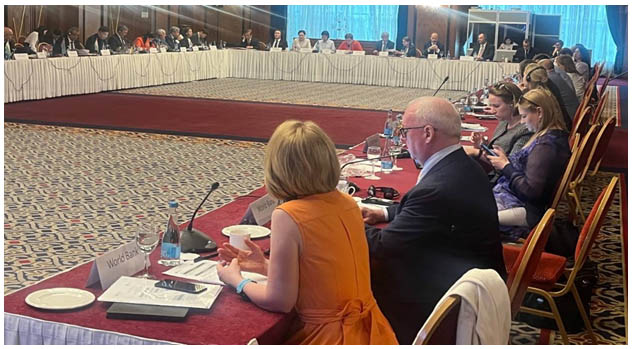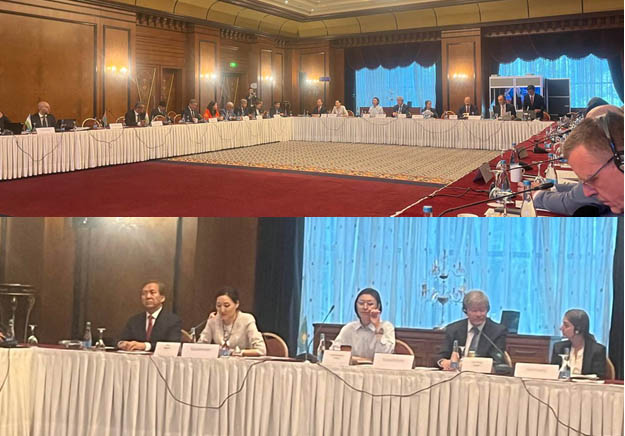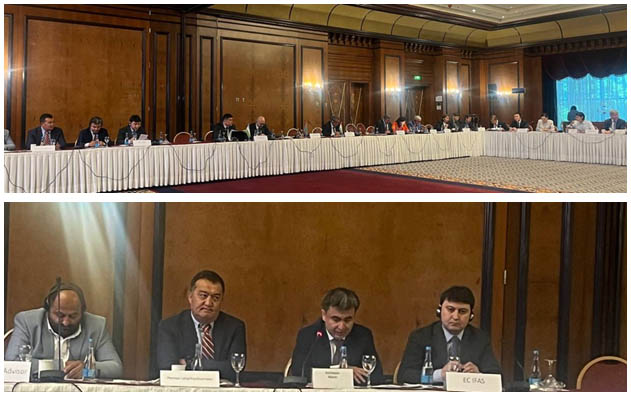SECOND REGIONAL HIGH-LEVEL POLICY DIALOGUE ON THE "ENERGY-WATER-LAND USE NEXUS IN CENTRAL ASIA"
The Second Regional High-Level Policy Dialogue on the "Energy-Water-Land Use Nexus in Central Asia” organized by the Organization for Economic Cooperation and Development (OECD) and the Government of Kazakhstan took place in Almaty on June 16. The event was held for high-level representatives from ministries of Kazakhstan, Kyrgyzstan, Tajikistan, Turkmenistan, and Uzbekistan, including regional and international partners.
The High-Level Dialogue's agenda included discussions on a regional approach to climate change adaptation and the climate impact on Central Asian economies, the water issues as a key challenge for the Central Asian region, the development of renewable energy sources, and the rational use of land resources.
The Dialogue provided an overview of activities planned as a part of the upcoming project "Regional mechanisms for low-carbon, climate resilient transformation of the energy-water-land nexus in Central Asia", which will be funded by the International Climate Initiative of the German Federal Ministry for Environment and implemented by a consortium of partners of OECD (coordinator), UNECE, EBRD (with FAO) and SIC ICWC. The project is scheduled to start in October 2022 and will remain in effect for 4 years.
The project aims to:
- operationalise the energy-water-land use nexus through enhanced economic and financial analytical work at regional and national level to demonstrate the “business case” for co-operation on the nexus,
- pave the way for countries to modify planning processes and adopt a whole-of-government approach to addressing the nexus and develop a regional strategy in the context of climate change,
- develop and apply tools to increase private sector involvement (related to agribusiness) in nexus-related investments,
- promote integration of policy, technology and investment for climate-resilient nexus transformation .
The project will be organized along the following lines:
- Supporting regional and national level processes for nexus development (policy dialogue)
- Economic modeling and knowledge base
- Development and adoption of methodological approaches and tools
- Sustainable financing and investments
- Capacity building
The following ministries will act as the focal points for the project:
- Kazakhstan: Ministry of Ecology, Geology and Natural Resources
- Kyrgyzstan: Ministry of Economy and Commerce
- Tajikistan: Ministry of Economic Development and Trade
- Turkmenistan: Ministry of Foreign Affairs
- Uzbekistan: Ministry of Investment and Foreign Trade
The Vice-Minister of Ecology, Geology and Natural Resources of Kazakhstan, representatives of the Ministry of Economy and Commerce of Kyrgyzstan, the Ministry of Economic Development and Trade of Tajikistan, the Ministries of Foreign Affairs of Turkmenistan and Uzbekistan, the IFAS Executive Committee, Ms. Monica Iwersen, Ambassador of the Federal Republic of German in Kazakhstan , Mr. Jurgen Keinhorst, Head of Regional Division for Africa, Middle East, Eastern Europe and Central Asia of the Federal Ministry for the Environment, Nature Conservation, Nuclear Safety and Consumer Protection (BMUV), Germany spoke at the high-level segment on the role of regional cooperation in the energy, water and land use nexus and the climate change impact in Central Asia



Separate sessions were devoted to presentations of project Consortium partners on planned activities (session 1), country and regional level activities on the adoption of a regional approach to adaptation (session 2) and adoption of an intersectoral approach to address water issues as the main challenge in the Central Asian region (session 3), adoption of an intersectoral approach to the development of renewables in Central Asia (session 4), as well as to similar programs and projects in the region that promote water, energy, food and ecosystem nexus (USAID and European Union projects, Green Central Asia, Blue Peace Switzerland, FAO activities and others).
In conclusion, the participants of the meeting expressed their support to the planned activities.
|